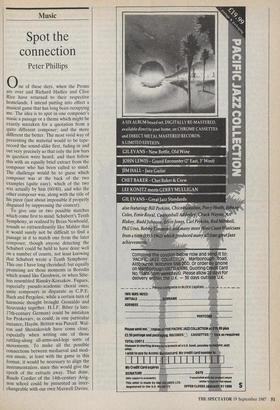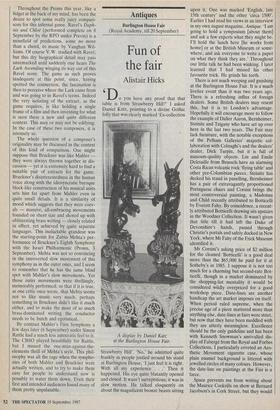Music
Spot the connection
Peter Phillips
One of these days, when the Proms are over and Richard Hadlee and Clive Rice have returned to their respective homelands, I intend putting into effect a musical game that has long been occupying me. The idea is to spot in one composer's music a passage or a theme which might be exactly mistaken for a quotation from a quite different composer; and the more different the better. The most vivid way of presenting the material would to be tape- record the sound-alike first, fading in and out very precisely so that only the few bars in question were heard, and then follow this with an equally brief extract from the composer who has been called to mind. The challenge would be to guess which composer was at the back of the two examples (quite easy), which of the two was actually by him (60/40), and who the other composer was, along with the title of his piece (just about impossible if properly disguised by suppressing the context).
To give one or two possible matches which come first to mind: Schubert's Tenth Symphony, as realised by Brian Newbould, sounds so extraordinarily like Mahler that it would surely not be difficult to find a passage in it to match one from the later composer, though anyone detecting the Schubert could be held to have done well on a number of counts, not least knowing that Schubert wrote a Tenth Symphony. This one I have long cherished; but equally promising are those moments in Borodin which sound like Gershwin, or when Sibe- lius resembled Rimsky-Korsakov. Fugues, especially pseudo-academic choral ones, unite composers as disparate as C.P.E. Bach and Pergolesi, while a certain turn of harmonic thought brought Gesualdo and Stravinsky together. H.I.F. Biber (a late- 17th-century German) could be mistaken for Prokoviev, as could, in one particular instance, Haydn. Britten was Purcell. Wal- ton and Shostakovich have come close, especially when writing one of those rattling-along all-arms-and-legs sorts of movements. To make all the possible connections between mediaeval and mod-. ern music, at least with the game in this format, it would be necessary to align the instrumentation, since this would give the epoch of the extracts away. That done, Baude Cordier of the 14th-century Avig- non school could be presented as inter- changeable with our own Maxwell Davies. Throughout the Proms this year, like a fidget at the back of my mind, has been the desire to spot some really juicy compari- sons for this infernal game. Ravel's Daph- nis and Chloe (performed complete on 8 September by the RPO under Previn) is a minefield of predictions, some no more than a chord, to music by Vaughan Wil- liams. Of course V.W. studied with Ravel; but this dry biographical detail may pass unremarked until suddenly one hears The Lark Ascending winging its way out of this Ravel score. The game as such proves inadequate at this point, since, having spotted the connection, the fascination is then to perceive where the Lark came from and was going to in Ravel's terms. Indeed the very isolating of the extract, as the game requires, is like holding a single frame of a film and then inventing for what is seen there a new and quite different context. This may or may not be edifying. In the case of these two composers, it is intensely so.
The whole question of a composer's originality may be discussed in the context of this kind of comparison. One might suppose that Bruckner was like Mahler they were always thrown together in dis- cussion — yet it is extremely hard to find a suitable pair of extracts for the game. Bruckner's disinterestedness in the human voice along with the idiosyncratic baroque block-like construction of his musical units sets him far apart from Mahler even in quite small details. It is a similarity of mood which suggests that they were coev- als — massive, all-embracing movements founded on sheer size and shored up with obliterating brass writing — closely related in effect, yet achieved by quite separate languages. This ineluctable grandeur was the starting-point for Zubin Mehta's per- formance of Bruckner's Eighth Symphony with the Israel Philharmonic (Proms, 3 September). Mehta was not so convincing in the introverted slow movement of this symphony as in the outer ones, and I seem to remember that he has the same blind spot with Mahler's slow movements. Yet those outer movements were thrillingly, memorably performed; so that if it is true, as one critic once wrote, that Mehta seems not to like music very much, perhaps something in Bruckner didn't like it much either, and to make the most of so much brass-dominated writing the conductor needs to be butch and egotistical.
By contrast Mahler's First Symphony a few days later (6 September) under Simon Rattle had a much less autocratic feel to it. The CBSO played beautifully for Rattle, but I missed the one-man-against-the elements thrill of Mehta's style. This phil- osophy was all the rage when the sympho- nies of both Mahler and Bruckner were actually written, and to try to make them easy for people to understand now is possibly to water them down. Even their first and intended audiences found many of them pretty unpalatable.



































































 Previous page
Previous page